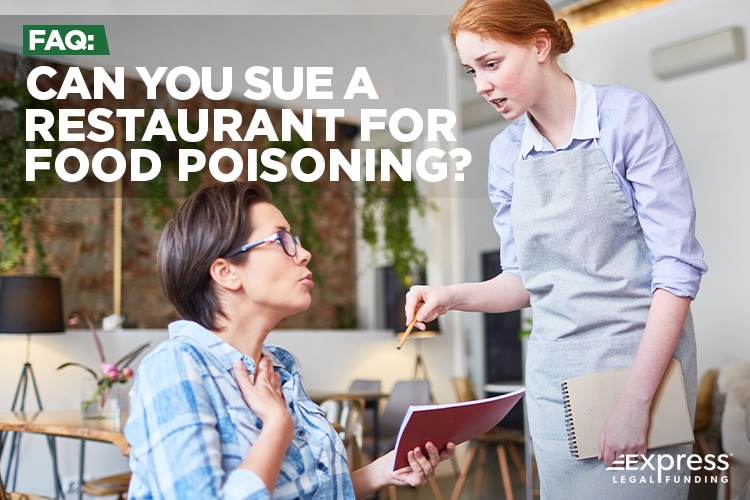
Food poisoning is an unpleasant situation that many people have been through at least once in their lives. It could come from any food if it was mishandled or expired by the time you ate it.
Food poisoning can be more than just a serious health matter. Violation of laws to enforce food safety and prevent foodborne illness can bring legal or even criminal consequences for those at fault.
The legal repercussions surrounding your ability to sue a restaurant for food poisoning and the potential for lawsuits and settlements that follow will be our primary focus for this blog article.
Can You Sue a Restaurant For Food Poisoning?
Yes, you can sue a restaurant for food poisoning if the restaurant’s negligent actions caused your food poisoning illness. By filing a lawsuit against the negligent restaurant, you can receive money from a settlement or court award to compensate you for the financial damages you incurred due to the food poisoning.
For instance, you can sue a restaurant for the salmonella contamination that made you sick by eating there.
You especially have a strong claim if your salmonella infection came from the employees not following the required guidelines (i.e., not washing their hands after they use the restroom).
However, the events leading up to your getting food poisoning from the restaurant are a matter of vital evidence and the success of your claim.
Food Poisoning From a Restaurant
Although restaurants try to employ staff who ensure the ingredients they use in the kitchen are fresh and safe for consumption, that is not always the case.
Even with precautions, poor ingredients that are spoiled can find their way to your table for you to eat.
When restaurant food poisoning happens, it is always important to know where you stand and if the ingredients from the restaurant are the cause of your becoming ill.
That’s because you can file a lawsuit and fully and legally sue a restaurant for money for the food poisoning you suffered.
However, having a successful claim against a restaurant for food poisoning depends on the exact circumstances surrounding your case against the dining establishment.
With this article, we hope to help clarify how you can sue a restaurant whose food gave you food poisoning and if you even have a case worth pursuing in the first place.
Filing a food poisoning lawsuit against a restaurant is one thing, but it’s an entirely different story on whether or not you can win.
Depending on the state in which the restaurant is located, food poisoning lawsuits can fall under one or both of the following lawsuit types:
Types of Food Poisoning Lawsuits:
- Personal injury cases
- Product liability law claims
If the food poisoning was the cause of fatalities, it could even result in wrongful death claims being filed.
What Are the Details of Your Restaurant Food Poisoning?
The biggest challenge of pursuing a lawsuit against a restaurant for food poisoning is the illness itself. Food poisoning is a remarkably broad term, and such broadness around the conditions of foodborne illness can hurt your ability to sue a restaurant for money.
The reality is food poisoning can range from a minor issue you overcome within a week to a severe and life-threatening sickness that can put you in the hospital.
It largely depends on the type of contaminants in the food and your health conditions when you eat the spoiled and no longer edible contaminated food.
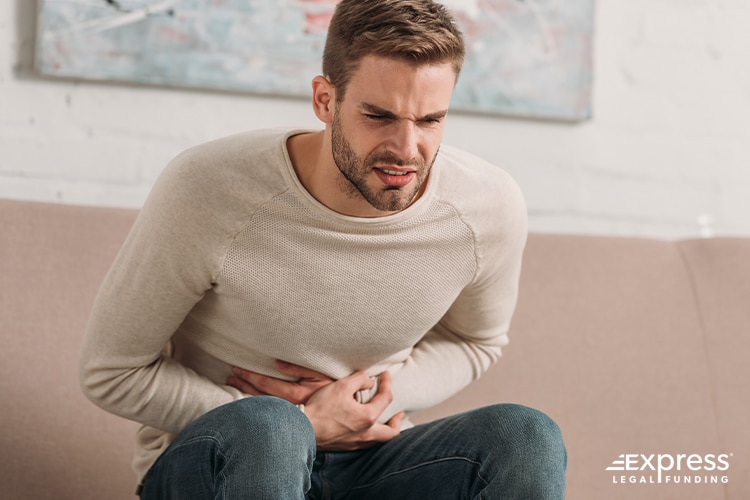
The severity of your food poisoning is a significant factor in the viability of any legal claim against restaurants and other types of dining establishments.
If you only have minor symptoms of food poisoning, you are less likely to be taken as seriously, even if true.
Yet, it can indicate that the restaurant is serving contaminated food and needs to resolve the problem and is possibly part of a much larger scale issue.
Where that could come into play and be the most beneficial to your legal claim regards is a large fast food restaurant with many franchise locations.
It helps not to be the singular victim if your food poisoning symptoms are more uncomfortable than dangerous.
What Are the Common Symptoms of Foodborne illness?
Food poisoning’s symptoms are relatively straightforward and scale with the severity of the bacteria and pathogens in the food.
Typical Symptoms of Food Poisoning:
- Nausea
- Diarrhea
- Vomiting
- Projectile vomiting
- Abdominal pain
- Fever
Unfortunately, these symptoms are similar to many common conditions that affect the stomach and gastro system, such as the stomach flu.
This makes it difficult to identify food poisoning as the illness responsible for making you sick.
Many people misidentify stomach ailments like food poisoning as having the stomach flu, which can easily lead the similar symptoms to further confuse the matter.
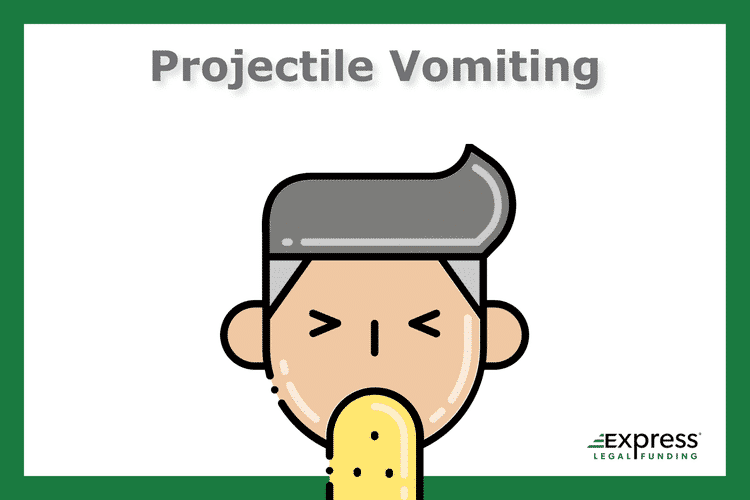
However, there are instances of food poisoning that can lead to more severe foodborne illnesses that warrant hospitalization and medical attention.
These situations with severe symptoms that cause you to put your life on hold give you a greater chance of success in suing a restaurant for food poisoning.
This situation is especially true for those with underlying conditions that predispose them to fragile physical health and lower immune systems.
What Are Biological Contaminants in Food?
There is a significant number of foodborne illnesses that can arise from advanced food poisoning.
Food Contaminant Types:
- E. Coli
- Botulism
- Norovirus
- Vibrio
- Shigella
- Campylobacter
- Listeria
- Hepatitis A
- Rotavirus
- Salmonella
Foods such as meat, eggs, shellfish, and even some vegetables can commonly host these bacteria and, when ingested, cause you to suffer severe illness.
The more severe and evident your symptoms of food poisoning, the simpler the job it will be to sue the restaurant.
However, with all this said, the final and most crucial question remains. How do you prove the restaurant is responsible for causing your food poisoning illness?
How To Prove Food Poisoning From a Restaurant?
How you can succeed at proving a restaurant over food poisoning is similar to filing a personal injury claim following a car accident. That is, to be successful in your legal claim, you need evidence to prove that the person or business you are filing a lawsuit against is responsible for your subsequent medical issues.
In the case of food poisoning lawsuits, proving a restaurant is responsible for your foodborne illness generally means proving it is solely responsible for causing you to get sick. That is why food poisoning cases with multiple defendants are rarely expected.
In the legal system, proving that the restaurant’s food preparation is directly responsible for your food poisoning is referred to as proving fault.
Hire a Food Poisoning Lawyer
Typically, it is much more challenging to prove the restaurant is at-fault for a food poisoning lawsuit than it is with a restaurant slip and fall recorded by a video camera.
That is why it is so vital to hire a food poisoning lawyer to represent you for your claim and not attempt to settle on your own.
Food poisoning attorneys specialize in proving that a restaurant is liable to compensate you for the loss that was a result of your foodborne illness.
Document Evidence in Food Poisoning Lawsuits
Documentation evidence is vital when establishing the restaurant’s fault and liability in your food poisoning lawsuit. That can come down to medical records and the receipt from your meal that caused your food poisoning at the restaurant.
However, before using that evidence to sue a restaurant, you must start with the basics. You should contact your primary care physician as soon as your food poisoning symptoms present themselves.
The doctor can ask you for details about your symptoms and advise you on what steps to take next Not only is contacting your doctor important for your health, it is critical to any food poisoning case against a restaurant.
That’s because if you did not receive any medical attention for your food poisoning illness, the financial damages you suffered are less compelling to the restaurant’s third-party liability insurance company.
However, there are other aspects you should consider when trying to prove that the restaurant is the at-fault party and that its negligent actions caused the foodborne illness, which led you to become a victim of food poisoning.
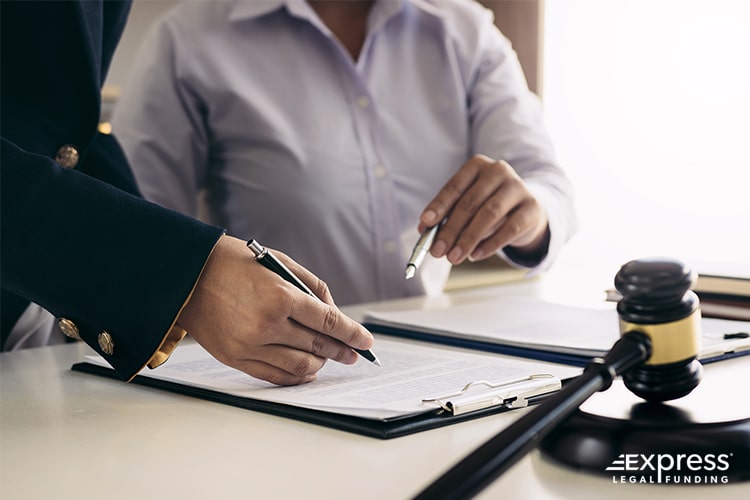
In addition to the medical records and restaurant receipt, you should establish and write down your food poisoning timeline.
This timeline record of when you first ate at the restaurant and when you first started to experience symptoms will help build a successful lawsuit against the restaurant. The symptoms are not immediate.
That makes it harder to pin down the restaurant as causing your food poisoning due to the time delay. All the more, the reason not to delay in getting legal advice for your potential lawsuit.
Food Poisoning Timeline is Evidence For Lawsuit
Food poisoning symptoms typically take effect within 6 to 24 hours of ingesting contaminated food.
However, it helps if you also keep in mind any additional meals you might have consumed between eating at the restaurant and when symptoms of your food poisoning began to present themselves.
Having a record of all your meals is essential because anything else you might have eaten within the 6-to-24-hour timeline after eating at the restaurant might be the source of your food poisoning as well.
So, if your food poisoning timeline only has you eating food from the restaurant before you get sick, the timeline will support the evidence in your favor.
For example, if you ate dinner at a fast food restaurant and did not eat anything else before you woke up in the morning feeling very sick with nausea, you would not have to consider other meals and snacks complicating your case.
Regarding the food poisoning timeline, the more specific and detailed the notes you make, the better it can strengthen your case.
The more details you can provide about symptoms, pain, and other unpleasant effects associated with your restaurant food poisoning, the better.
When your food poisoning lawyer presents your case to the defendant’s attorney, these details can illustrate the suffering and financial harm you went through.
They demonstrate to the insurance company of the restaurant the level of compensation you deserve for such suffering and loss.
The receipt from the restaurant and your word alone will not be enough to sway a personal injury lawsuit in your favor. You will need to provide hard evidence that you were suffering from food poisoning.
To that end, your visit to your physician, an urgent clinic, or an emergency room is critical.

Your primary care physician or ER doctor can conduct tests on urine, stool, or blood that will specifically look for markers unique to food poisoning. These tests come back with test results that can definitely what exactly foodborne bacteria or virus you had at the time of the test.
Depending on the circumstances, the restaurant’s lawyers can have the food you consumed at the restaurant for any microbes that are known to cause food poisoning. The defendants in the food poisoning might do that to try and build their defense and protect themselves from you.
However, your lawsuit will be much stronger if your test results return from the lab with the same microbes found in the restaurant’s food products you ate.
It, alongside your restaurant receipt, can all but help you prove that you did, in fact, have food poisoning, and it originated from the restaurant’s food safety issues.
In some cases, your food poisoning timeline can be further corroborated by the stories of other diners at the restaurant on the same day as you.
For example, if there were others in the restaurant who happened to order the same meal as you on the same day, they would likely have developed food poisoning as well.
That means power in numbers helps with food poisoning lawsuits. So the more diners that contract food poisoning after dining at a restaurant can be a powerful form of evidence to prove that the restaurant’s food is the reason for your and each other’s illness.
In rare cases with larger chains, there may even be potential for filing a class action lawsuit or MDL.
However, class action lawsuits for food poisoning are not something you should rely on to recover financial damages if a class action suit is not currently in process.
There are too many variables involved to rely on others having gotten food poisoning to build a case against a food establishment.
For example, the claim might be individual to you. Suppose the cause of your food poisoning was due to a specific dish rather than a widespread contamination issue in the restaurant’s kitchen.
In that case, you may have been the only one to order the food that made you ill in the same time frame.
Gathering this evidence is paramount to a successful food poisoning case against a restaurant. However, as mentioned earlier, you might wonder what category case you are dealing with, and the answer might surprise you, given the nature of the claim.
What Types of Food Poisoning Lawsuits Are There?
Although food poisoning is not your average legal issue, it can justify lawsuits. Pursuing a food poisoning lawsuit against a restaurant for financial damages will fall under the category of a personal injury claim in most states. However, it is also considered a product liability claim in many states.
This means that the procedures and compensation for food poisoning cases are similar to those used in motor vehicle accident claims.
So once you and your attorney are confident that the restaurant’s food was responsible for your food poisoning, you can pursue a claim to compensate for the costs of any treatment or hospitalization and damages incurred.
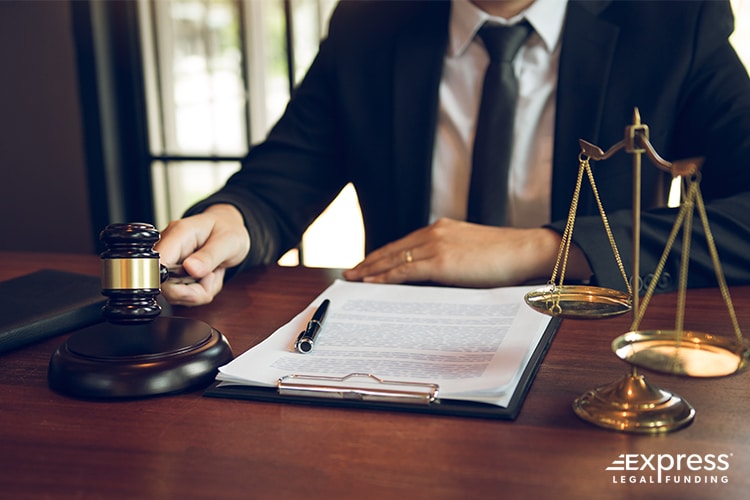
However, pursuing a claim over food poisoning caused by the food served or made by a restaurant does mean you need to have sought expensive medical treatment for the symptoms you were experiencing.
Still, it will likely lessen your odds of a sizable settlement if your symptoms are minor and do not require consultation with a primary care physician.
Medical care for food poisoning is not required to file a claim. However, without proof of getting seen by a doctor and having minimal symptoms, you will significantly reduce your odds of winning fair compensation compared to those with more advanced symptoms and proof of treatment.
The severity of food poisoning is one of the significant obstacles in pursuing a claim against a restaurant.
Having severe or advanced symptoms of food poisoning that cost you financially will likely be more worthwhile to pursue a case against the food establishment.
However, as always, we recommend you seek to hire a personal injury attorney to represent your interests in the case. Some law firms even specialize in litigating food poisoning cases against restaurants.
Are Restaurants Under Strict Liability Law?
Yes, restaurants are under strict liability law in most states, which is a primary benefit you have when pursuing a liability case against a restaurant. Once it is proven that the food from the restaurant is the source of the food poisoning, the restaurant is under strict liability in most states.
What strict liability means is that, even if the restaurant was unaware that they were serving food with contaminated ingredients or the faulty work from their distributor caused the foodborne bacteria, they still might be responsible for compensating your damages.
Strict liability makes the fact that there was food contamination strictly their problem.
That said, the restaurant can then turn around and sue their supplier after their case with you is over. Either way, that’s not your problem as the person who got food poisoning to worry about.
Establishing a case for a personal injury claim over food poisoning can be difficult as success requires a lot of detail regarding the symptoms and timeline.
However, with the proper records and information, you can see a rapid resolution of your case.
How Much Can You Sue a Restaurant for Food Poisoning?
Since food poisoning claims are a form of personal injury, the overall benefits of pursuing a case are relatively similar in that you will likely be able to settle for money. You would be suing the restaurant for damages incurred due to the food poisoning it caused.
These damages can cover several costs you incurred while you were sick from the foodborne illness. In addition to damages for bodily harm, you will often be able to receive other types of damages for less tangible purposes.
Your settlement will tend to scale to mainly deal with the costs of your medical treatment above all else so that you are not left struggling to pay off your medical providers for the treatment you received.
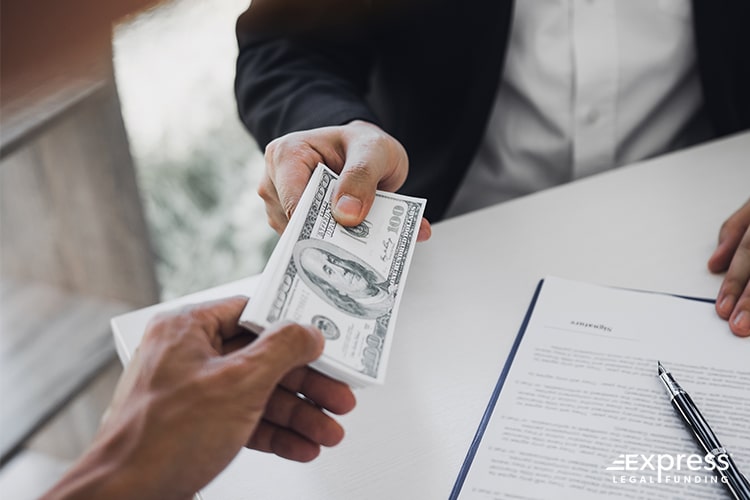
In addition to the food poisoning settlement being designed to help you deal with your medical costs, it can also compensate you for lost wages if the severe symptoms cause you to miss work.
Pain and Suffering From Food Poisoning Lawsuits
In some cases, you might even receive funds to compensate you for other damages like pain and suffering. The damages can be physical suffering from the physical side effects and even mental suffering from psychological and trauma issues like having anxiety when eating.
With this said, pain and suffering being factors in food poisoning lawsuit settlement amounts are not typical.
Still, that does not mean you should want to go to court just in hopes of getting compensated for pain and suffering.
Most attorneys like to avoid the risk of going to trial and instead get a large settlement for their clients early on. The same goes for personal injury attorneys handling food poisoning lawsuit cases.
Can You Sue a Fast Food Restaurant For Food Poisoning?
Yes, you can sue a fast food restaurant for causing you to suffer a foodborne illness due to contamination. In fact, there are times the restaurant might be inclined to offer you a settlement early on to avoid the bad publicity that food poisoning lawsuits can bring.
It makes for negative advertising for a restaurant to be associated with food making its customers sick.
This could be an upside of suing a national fast food restaurant for food poisoning compared to a local food company.
The counterargument is suing a large fast food restaurant means you will have to go up against corporate lawyers who will be extra careful to fight against litigious suits.
That makes it all the more important to have evidence backing up your food poisoning timeline.
The settlements for personal injury claims can result in you walking away with more money than you had before the incident. If you live in a state that allows medical liens, your personal injury lawyer can negotiate to reduce your medical bills.
That can leave more of the settlement check left over for you to keep.
While you should not count on your settlement going beyond helping resolve the medical expenses of your severe food poisoning and lost wages, the chance always exists that you will get something extra.
However, it’s important to keep in mind that there is no guaranteed settlement amount, and you will never be sure of getting anything out of your food poisoning case.
Notable Food Poisoning Lawsuits
One landmark case is the 1993 Jack in the Box E. coli outbreak that sickened over 700 people and resulted in multiple lawsuits. The company faced significant legal and financial repercussions due to inadequate cooking practices.
Another case involved Chipotle, which faced multiple outbreaks in 2015 linked to norovirus and E. coli. The incidents led to numerous lawsuits, settlement agreements, and a substantial overhaul of their food safety practices.
These cases highlight the severe consequences of food safety failures and the potential for litigation to drive industry changes.
Real Example of a Fast Food Restaurant Food Poisoning Case
In recent years, there have been several well-publicized instances of food poisoning involving diners getting sick from eating contaminated fast food. One of the more well-known fast food restaurants where people got foodborne illnesses includes the following:
Wendy’s Food Poisoning – E. Coli: In 2022, 109 people reported suffering food poisoning after eating at a Wendy’s restaurant. Most of them reported eating a hamburger or sandwich that had romaine lettuce on it.
Closing Statements on Restaurant Food Poisoning Lawsuits
Food poisoning incidents are rarely severe and often translate to you spending a few extra minutes with your head in the toilet bowl or a handful of additional trips to the bathroom.
However, when they warrant serious medical intervention, you can seek legal action and sue the restaurant responsible for causing the food poisoning you suffered.

If this is the situation for you while waiting for your way through a personal injury or product liability lawsuit, you should consider applying for legal funding.
It is a non-recourse pre-settlement cash advance that can be extended to plaintiffs who are suing for injuries and damages, like with a food poisoning lawsuit.
In exchange for a small portion of your potential settlement, legal funding companies can provide you with the funds you will need to pay your bills without stretching your savings too thin or going into debt.
The best part is that you are only obligated to ensure repayment to the funder if you win or settle the case and incur no risk of being in a deeper hole if you lose.
Contact us at Express Legal Funding today for a free consultation to learn more about whether pre-settlement funding is a good option for you. Plus, as a company, we have experience advancing money to plaintiffs with food poisoning claims against fast food restaurants.
